Organisational Culture, Politics, and Power: A David & Co. Limited
VerifiedAdded on 2021/01/02
|22
|5632
|92
Report
AI Summary
This report provides an analysis of organisational behaviour within A David & Co. Limited, a food product company. It explores the influence of organisational culture, politics, and power on employee performance, examining concepts like legitimate, reward, coercive, expert, and referent power. The report also delves into motivational theories, including Maslow's hierarchy of needs, to understand how to improve employee engagement and productivity. It highlights the impact of various cultural models and political dynamics on team and individual performance, emphasizing the importance of effective management and communication within the organisation. The report aims to offer insights into enhancing employee satisfaction and achieving organisational goals.
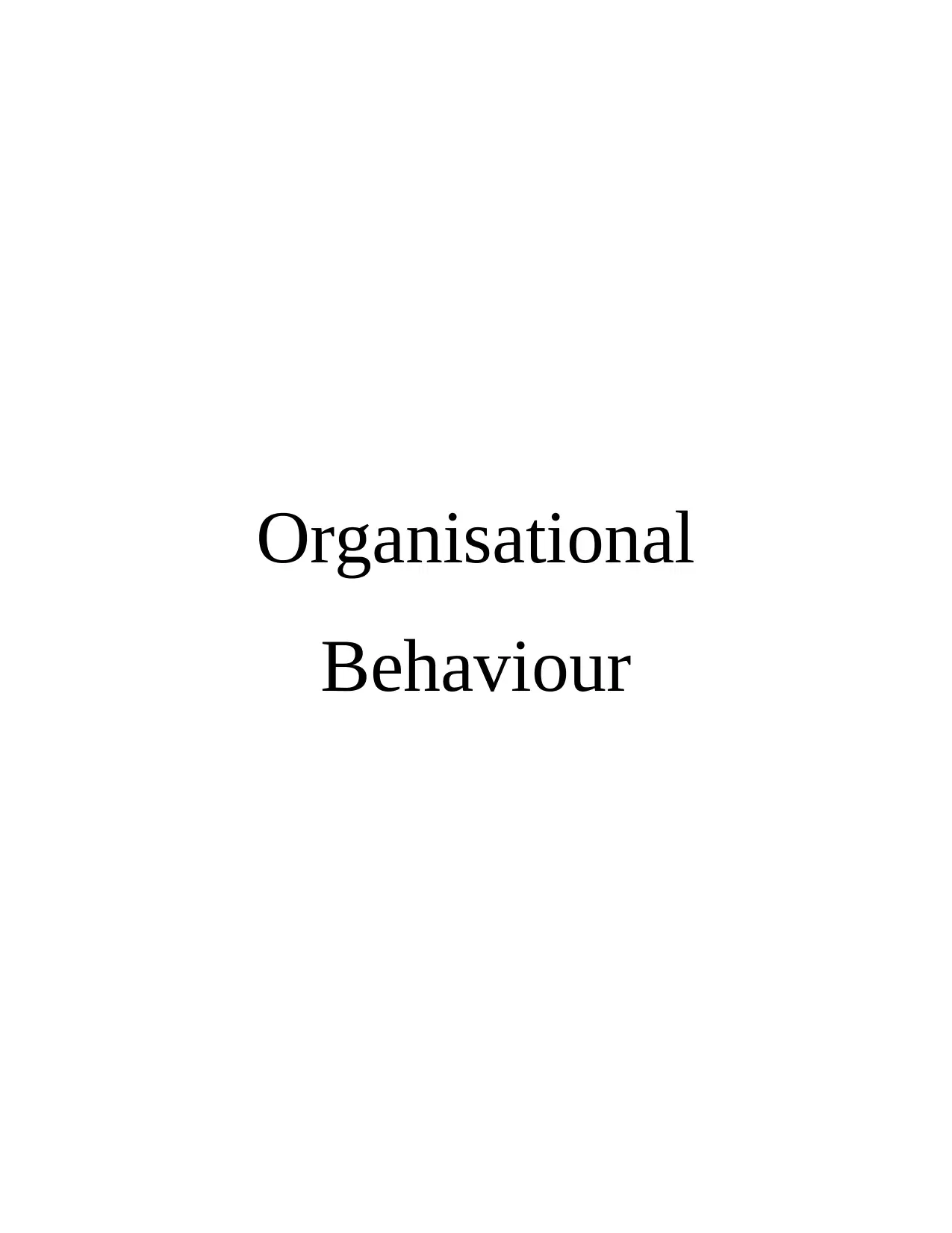
Organisational
Behaviour
Behaviour
Paraphrase This Document
Need a fresh take? Get an instant paraphrase of this document with our AI Paraphraser
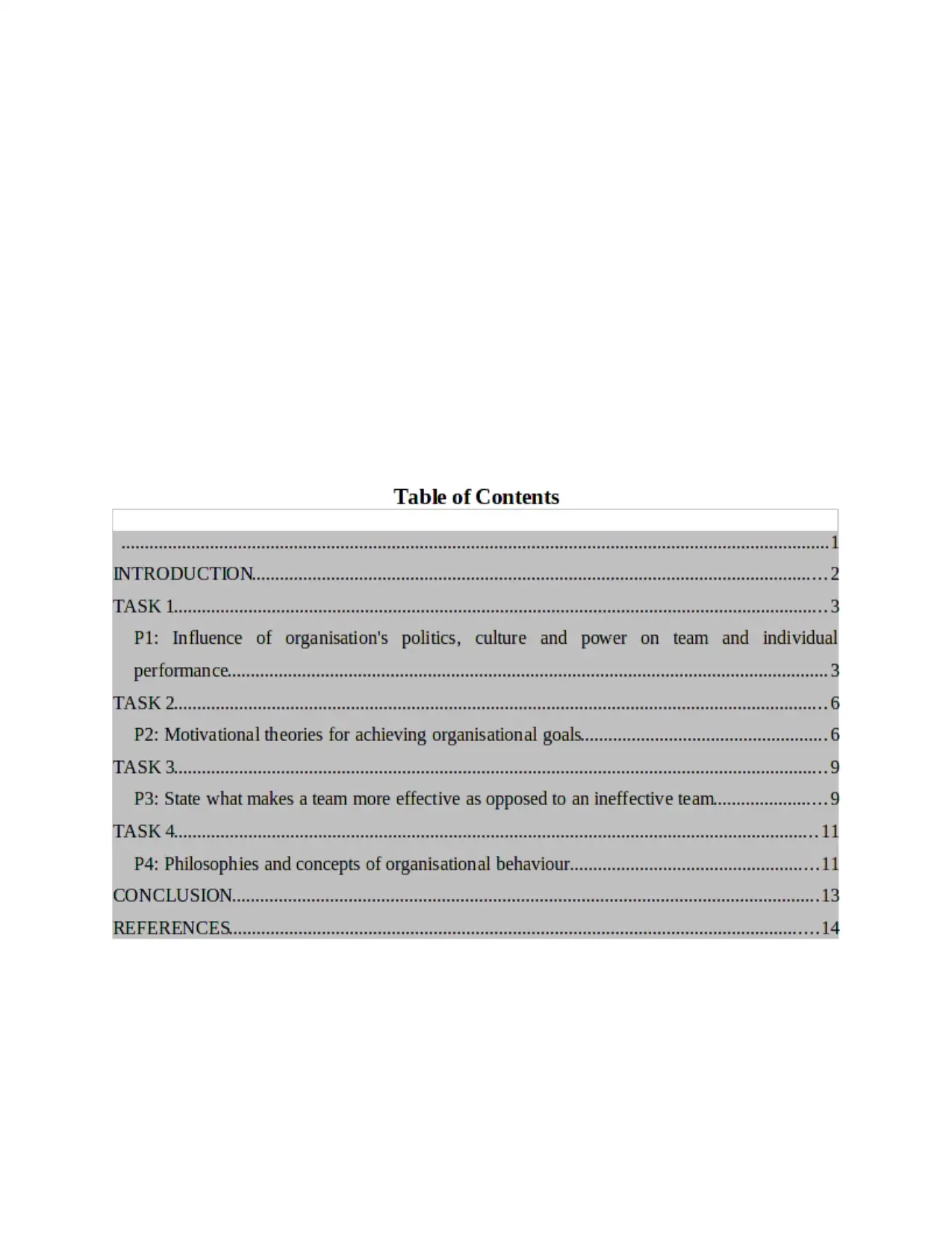
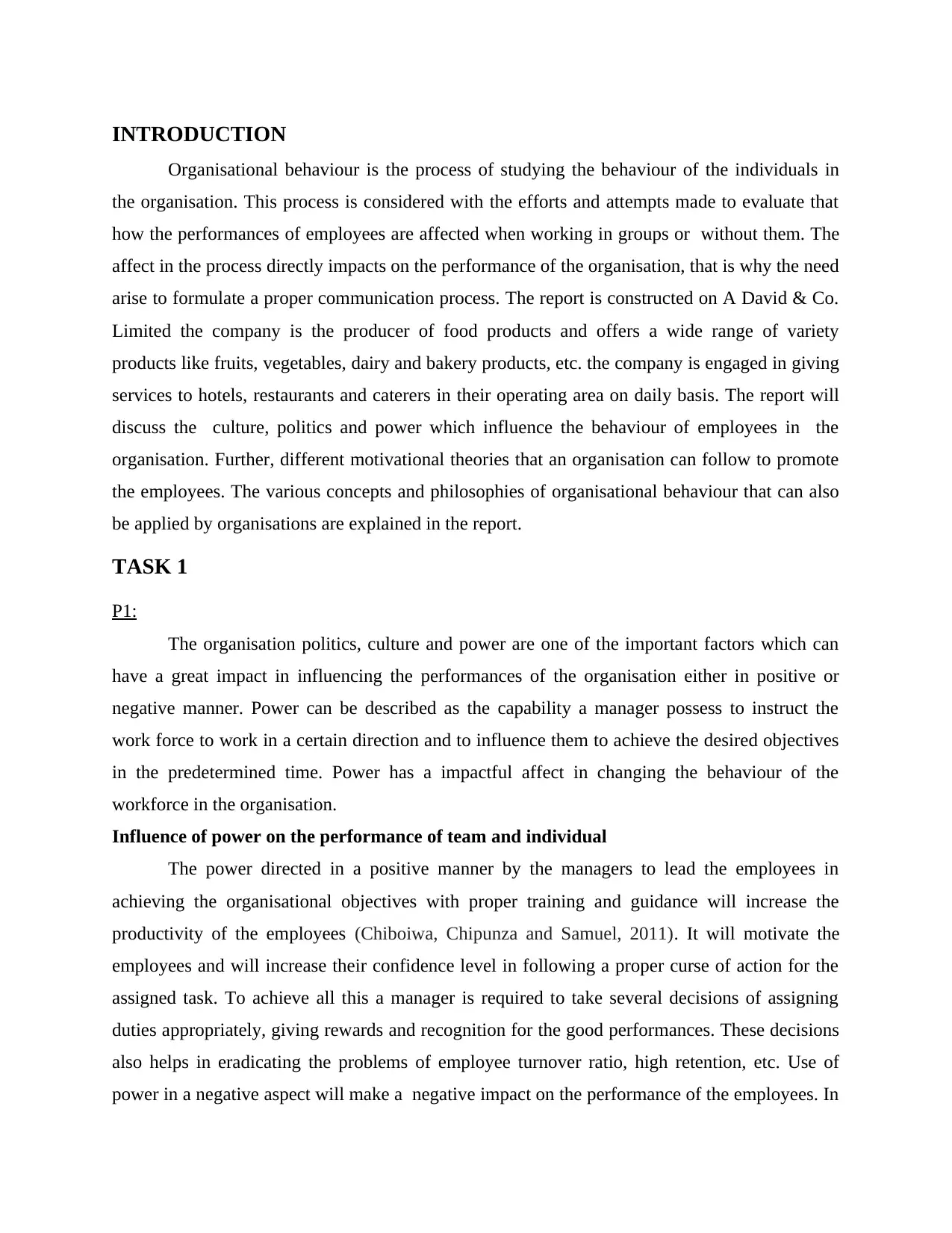
INTRODUCTION
Organisational behaviour is the process of studying the behaviour of the individuals in
the organisation. This process is considered with the efforts and attempts made to evaluate that
how the performances of employees are affected when working in groups or without them. The
affect in the process directly impacts on the performance of the organisation, that is why the need
arise to formulate a proper communication process. The report is constructed on A David & Co.
Limited the company is the producer of food products and offers a wide range of variety
products like fruits, vegetables, dairy and bakery products, etc. the company is engaged in giving
services to hotels, restaurants and caterers in their operating area on daily basis. The report will
discuss the culture, politics and power which influence the behaviour of employees in the
organisation. Further, different motivational theories that an organisation can follow to promote
the employees. The various concepts and philosophies of organisational behaviour that can also
be applied by organisations are explained in the report.
TASK 1
P1:
The organisation politics, culture and power are one of the important factors which can
have a great impact in influencing the performances of the organisation either in positive or
negative manner. Power can be described as the capability a manager possess to instruct the
work force to work in a certain direction and to influence them to achieve the desired objectives
in the predetermined time. Power has a impactful affect in changing the behaviour of the
workforce in the organisation.
Influence of power on the performance of team and individual
The power directed in a positive manner by the managers to lead the employees in
achieving the organisational objectives with proper training and guidance will increase the
productivity of the employees (Chiboiwa, Chipunza and Samuel, 2011). It will motivate the
employees and will increase their confidence level in following a proper curse of action for the
assigned task. To achieve all this a manager is required to take several decisions of assigning
duties appropriately, giving rewards and recognition for the good performances. These decisions
also helps in eradicating the problems of employee turnover ratio, high retention, etc. Use of
power in a negative aspect will make a negative impact on the performance of the employees. In
Organisational behaviour is the process of studying the behaviour of the individuals in
the organisation. This process is considered with the efforts and attempts made to evaluate that
how the performances of employees are affected when working in groups or without them. The
affect in the process directly impacts on the performance of the organisation, that is why the need
arise to formulate a proper communication process. The report is constructed on A David & Co.
Limited the company is the producer of food products and offers a wide range of variety
products like fruits, vegetables, dairy and bakery products, etc. the company is engaged in giving
services to hotels, restaurants and caterers in their operating area on daily basis. The report will
discuss the culture, politics and power which influence the behaviour of employees in the
organisation. Further, different motivational theories that an organisation can follow to promote
the employees. The various concepts and philosophies of organisational behaviour that can also
be applied by organisations are explained in the report.
TASK 1
P1:
The organisation politics, culture and power are one of the important factors which can
have a great impact in influencing the performances of the organisation either in positive or
negative manner. Power can be described as the capability a manager possess to instruct the
work force to work in a certain direction and to influence them to achieve the desired objectives
in the predetermined time. Power has a impactful affect in changing the behaviour of the
workforce in the organisation.
Influence of power on the performance of team and individual
The power directed in a positive manner by the managers to lead the employees in
achieving the organisational objectives with proper training and guidance will increase the
productivity of the employees (Chiboiwa, Chipunza and Samuel, 2011). It will motivate the
employees and will increase their confidence level in following a proper curse of action for the
assigned task. To achieve all this a manager is required to take several decisions of assigning
duties appropriately, giving rewards and recognition for the good performances. These decisions
also helps in eradicating the problems of employee turnover ratio, high retention, etc. Use of
power in a negative aspect will make a negative impact on the performance of the employees. In
⊘ This is a preview!⊘
Do you want full access?
Subscribe today to unlock all pages.

Trusted by 1+ million students worldwide
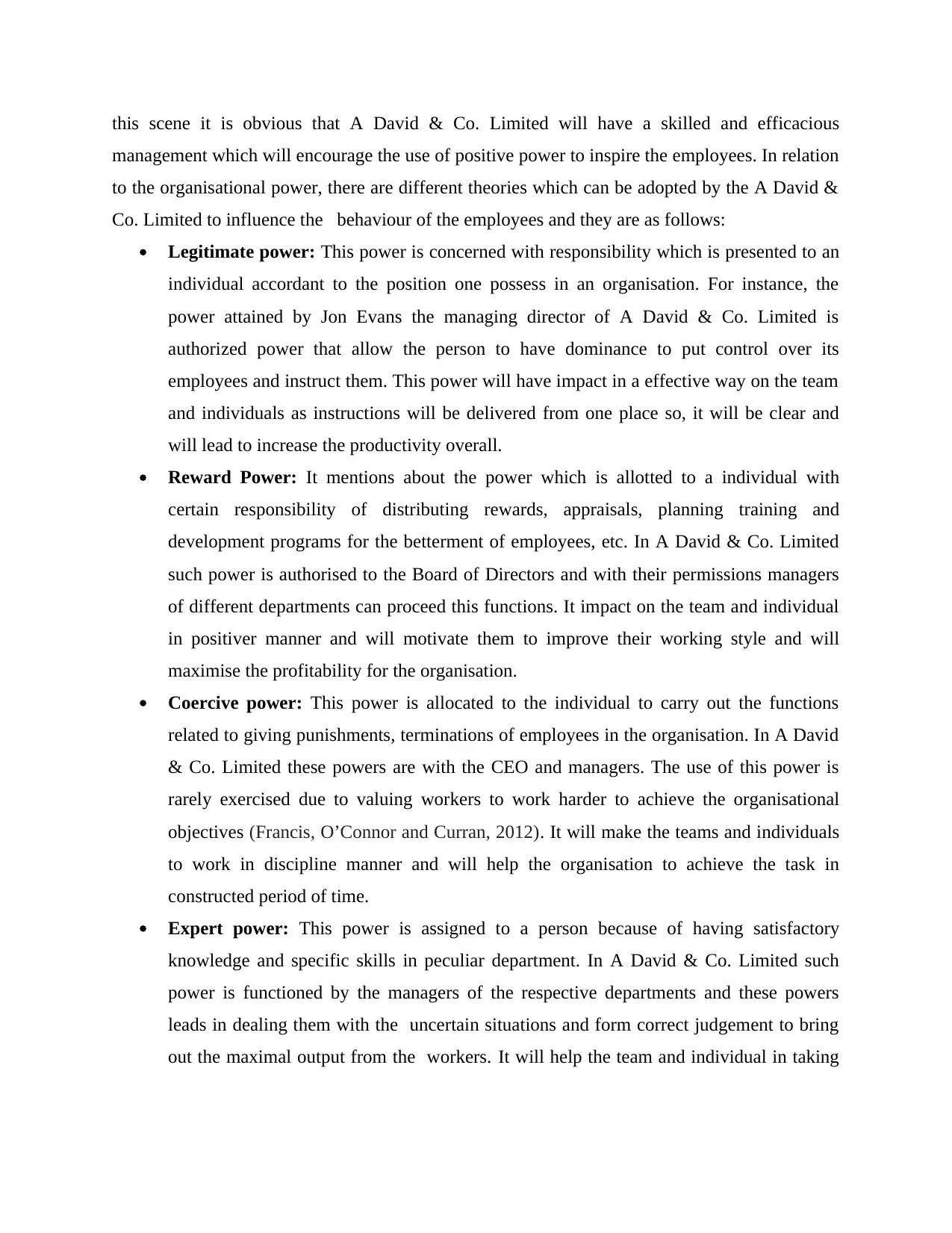
this scene it is obvious that A David & Co. Limited will have a skilled and efficacious
management which will encourage the use of positive power to inspire the employees. In relation
to the organisational power, there are different theories which can be adopted by the A David &
Co. Limited to influence the behaviour of the employees and they are as follows:
Legitimate power: This power is concerned with responsibility which is presented to an
individual accordant to the position one possess in an organisation. For instance, the
power attained by Jon Evans the managing director of A David & Co. Limited is
authorized power that allow the person to have dominance to put control over its
employees and instruct them. This power will have impact in a effective way on the team
and individuals as instructions will be delivered from one place so, it will be clear and
will lead to increase the productivity overall.
Reward Power: It mentions about the power which is allotted to a individual with
certain responsibility of distributing rewards, appraisals, planning training and
development programs for the betterment of employees, etc. In A David & Co. Limited
such power is authorised to the Board of Directors and with their permissions managers
of different departments can proceed this functions. It impact on the team and individual
in positiver manner and will motivate them to improve their working style and will
maximise the profitability for the organisation.
Coercive power: This power is allocated to the individual to carry out the functions
related to giving punishments, terminations of employees in the organisation. In A David
& Co. Limited these powers are with the CEO and managers. The use of this power is
rarely exercised due to valuing workers to work harder to achieve the organisational
objectives (Francis, O’Connor and Curran, 2012). It will make the teams and individuals
to work in discipline manner and will help the organisation to achieve the task in
constructed period of time.
Expert power: This power is assigned to a person because of having satisfactory
knowledge and specific skills in peculiar department. In A David & Co. Limited such
power is functioned by the managers of the respective departments and these powers
leads in dealing them with the uncertain situations and form correct judgement to bring
out the maximal output from the workers. It will help the team and individual in taking
management which will encourage the use of positive power to inspire the employees. In relation
to the organisational power, there are different theories which can be adopted by the A David &
Co. Limited to influence the behaviour of the employees and they are as follows:
Legitimate power: This power is concerned with responsibility which is presented to an
individual accordant to the position one possess in an organisation. For instance, the
power attained by Jon Evans the managing director of A David & Co. Limited is
authorized power that allow the person to have dominance to put control over its
employees and instruct them. This power will have impact in a effective way on the team
and individuals as instructions will be delivered from one place so, it will be clear and
will lead to increase the productivity overall.
Reward Power: It mentions about the power which is allotted to a individual with
certain responsibility of distributing rewards, appraisals, planning training and
development programs for the betterment of employees, etc. In A David & Co. Limited
such power is authorised to the Board of Directors and with their permissions managers
of different departments can proceed this functions. It impact on the team and individual
in positiver manner and will motivate them to improve their working style and will
maximise the profitability for the organisation.
Coercive power: This power is allocated to the individual to carry out the functions
related to giving punishments, terminations of employees in the organisation. In A David
& Co. Limited these powers are with the CEO and managers. The use of this power is
rarely exercised due to valuing workers to work harder to achieve the organisational
objectives (Francis, O’Connor and Curran, 2012). It will make the teams and individuals
to work in discipline manner and will help the organisation to achieve the task in
constructed period of time.
Expert power: This power is assigned to a person because of having satisfactory
knowledge and specific skills in peculiar department. In A David & Co. Limited such
power is functioned by the managers of the respective departments and these powers
leads in dealing them with the uncertain situations and form correct judgement to bring
out the maximal output from the workers. It will help the team and individual in taking
Paraphrase This Document
Need a fresh take? Get an instant paraphrase of this document with our AI Paraphraser
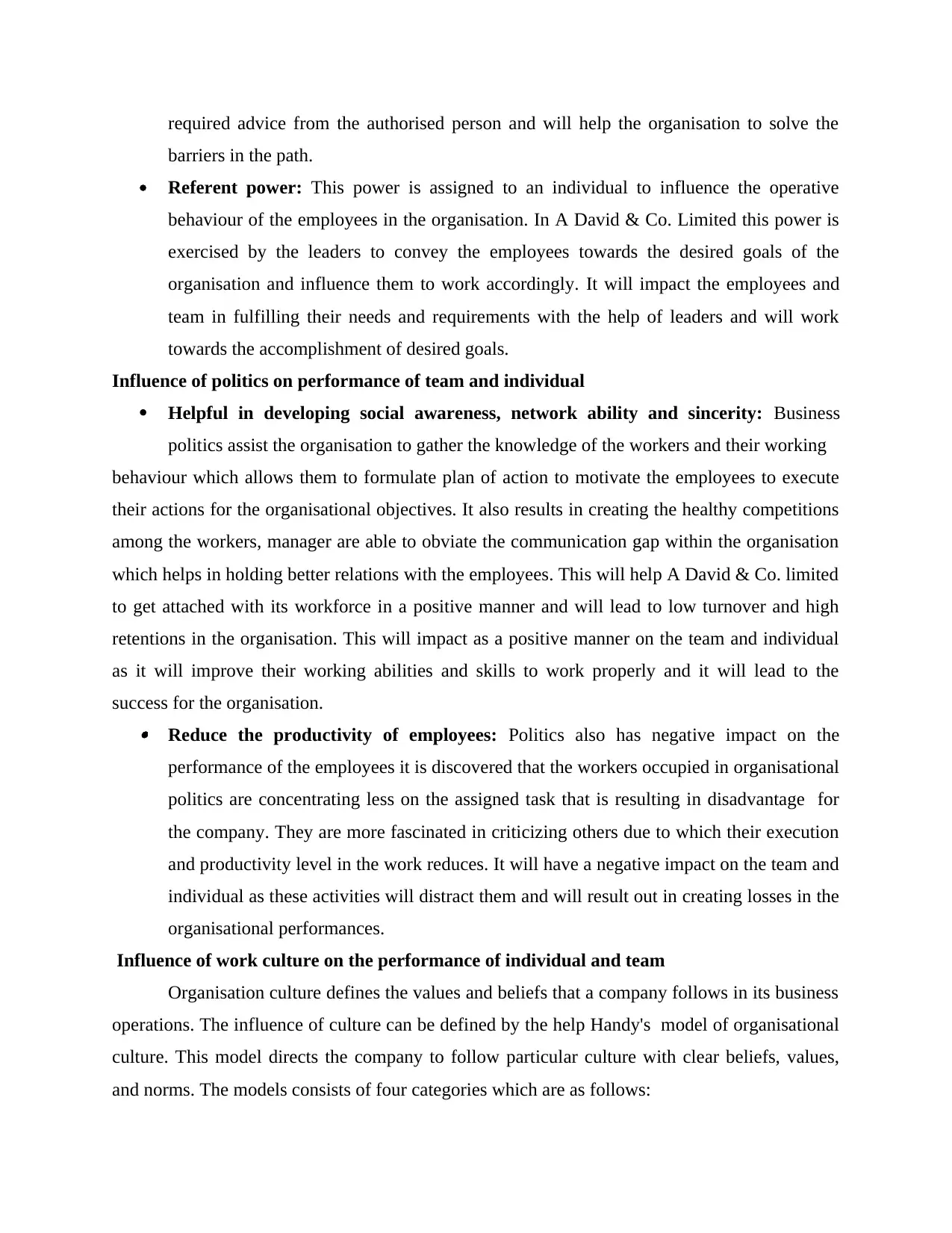
required advice from the authorised person and will help the organisation to solve the
barriers in the path.
Referent power: This power is assigned to an individual to influence the operative
behaviour of the employees in the organisation. In A David & Co. Limited this power is
exercised by the leaders to convey the employees towards the desired goals of the
organisation and influence them to work accordingly. It will impact the employees and
team in fulfilling their needs and requirements with the help of leaders and will work
towards the accomplishment of desired goals.
Influence of politics on performance of team and individual
Helpful in developing social awareness, network ability and sincerity: Business
politics assist the organisation to gather the knowledge of the workers and their working
behaviour which allows them to formulate plan of action to motivate the employees to execute
their actions for the organisational objectives. It also results in creating the healthy competitions
among the workers, manager are able to obviate the communication gap within the organisation
which helps in holding better relations with the employees. This will help A David & Co. limited
to get attached with its workforce in a positive manner and will lead to low turnover and high
retentions in the organisation. This will impact as a positive manner on the team and individual
as it will improve their working abilities and skills to work properly and it will lead to the
success for the organisation. Reduce the productivity of employees: Politics also has negative impact on the
performance of the employees it is discovered that the workers occupied in organisational
politics are concentrating less on the assigned task that is resulting in disadvantage for
the company. They are more fascinated in criticizing others due to which their execution
and productivity level in the work reduces. It will have a negative impact on the team and
individual as these activities will distract them and will result out in creating losses in the
organisational performances.
Influence of work culture on the performance of individual and team
Organisation culture defines the values and beliefs that a company follows in its business
operations. The influence of culture can be defined by the help Handy's model of organisational
culture. This model directs the company to follow particular culture with clear beliefs, values,
and norms. The models consists of four categories which are as follows:
barriers in the path.
Referent power: This power is assigned to an individual to influence the operative
behaviour of the employees in the organisation. In A David & Co. Limited this power is
exercised by the leaders to convey the employees towards the desired goals of the
organisation and influence them to work accordingly. It will impact the employees and
team in fulfilling their needs and requirements with the help of leaders and will work
towards the accomplishment of desired goals.
Influence of politics on performance of team and individual
Helpful in developing social awareness, network ability and sincerity: Business
politics assist the organisation to gather the knowledge of the workers and their working
behaviour which allows them to formulate plan of action to motivate the employees to execute
their actions for the organisational objectives. It also results in creating the healthy competitions
among the workers, manager are able to obviate the communication gap within the organisation
which helps in holding better relations with the employees. This will help A David & Co. limited
to get attached with its workforce in a positive manner and will lead to low turnover and high
retentions in the organisation. This will impact as a positive manner on the team and individual
as it will improve their working abilities and skills to work properly and it will lead to the
success for the organisation. Reduce the productivity of employees: Politics also has negative impact on the
performance of the employees it is discovered that the workers occupied in organisational
politics are concentrating less on the assigned task that is resulting in disadvantage for
the company. They are more fascinated in criticizing others due to which their execution
and productivity level in the work reduces. It will have a negative impact on the team and
individual as these activities will distract them and will result out in creating losses in the
organisational performances.
Influence of work culture on the performance of individual and team
Organisation culture defines the values and beliefs that a company follows in its business
operations. The influence of culture can be defined by the help Handy's model of organisational
culture. This model directs the company to follow particular culture with clear beliefs, values,
and norms. The models consists of four categories which are as follows:
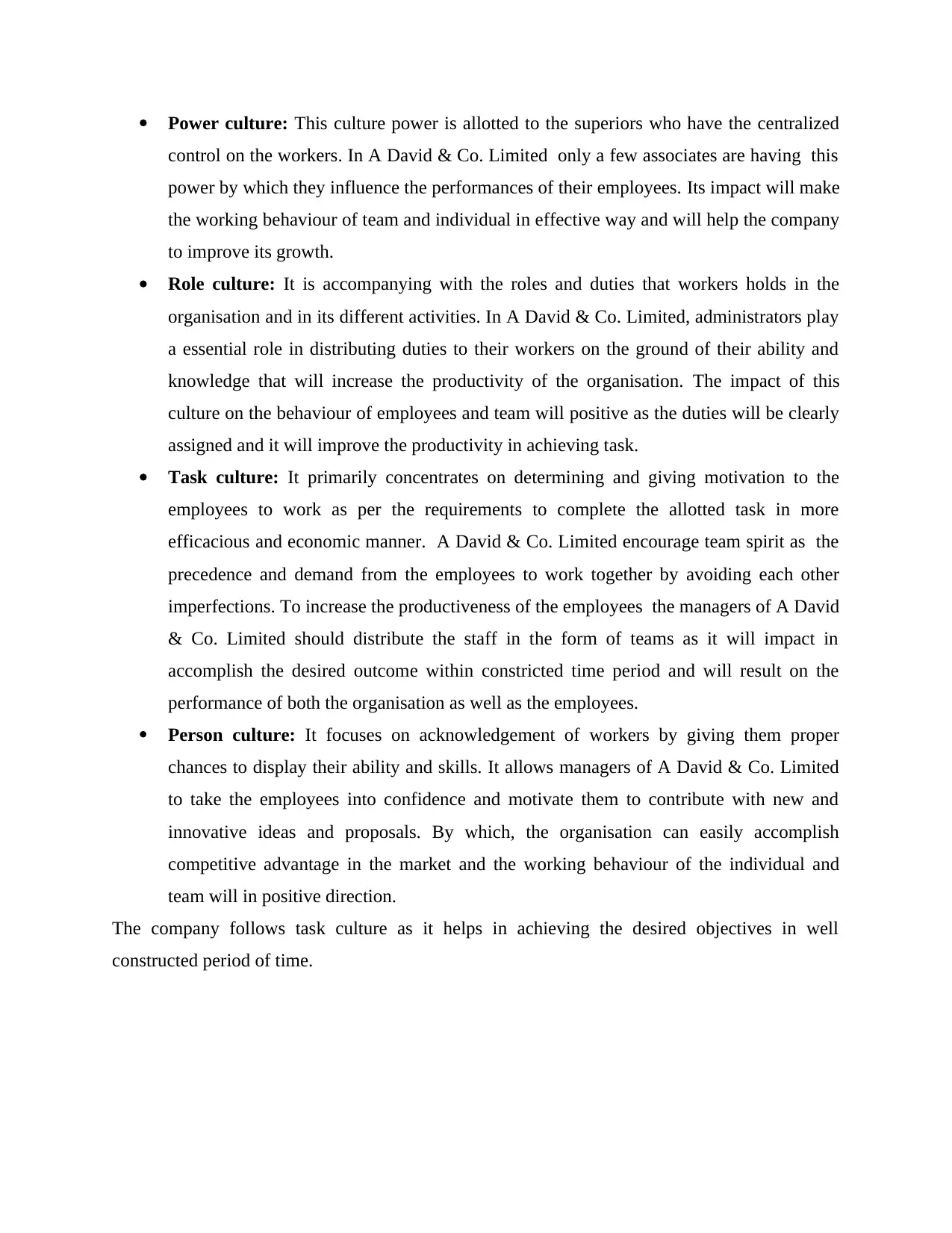
Power culture: This culture power is allotted to the superiors who have the centralized
control on the workers. In A David & Co. Limited only a few associates are having this
power by which they influence the performances of their employees. Its impact will make
the working behaviour of team and individual in effective way and will help the company
to improve its growth.
Role culture: It is accompanying with the roles and duties that workers holds in the
organisation and in its different activities. In A David & Co. Limited, administrators play
a essential role in distributing duties to their workers on the ground of their ability and
knowledge that will increase the productivity of the organisation. The impact of this
culture on the behaviour of employees and team will positive as the duties will be clearly
assigned and it will improve the productivity in achieving task.
Task culture: It primarily concentrates on determining and giving motivation to the
employees to work as per the requirements to complete the allotted task in more
efficacious and economic manner. A David & Co. Limited encourage team spirit as the
precedence and demand from the employees to work together by avoiding each other
imperfections. To increase the productiveness of the employees the managers of A David
& Co. Limited should distribute the staff in the form of teams as it will impact in
accomplish the desired outcome within constricted time period and will result on the
performance of both the organisation as well as the employees.
Person culture: It focuses on acknowledgement of workers by giving them proper
chances to display their ability and skills. It allows managers of A David & Co. Limited
to take the employees into confidence and motivate them to contribute with new and
innovative ideas and proposals. By which, the organisation can easily accomplish
competitive advantage in the market and the working behaviour of the individual and
team will in positive direction.
The company follows task culture as it helps in achieving the desired objectives in well
constructed period of time.
control on the workers. In A David & Co. Limited only a few associates are having this
power by which they influence the performances of their employees. Its impact will make
the working behaviour of team and individual in effective way and will help the company
to improve its growth.
Role culture: It is accompanying with the roles and duties that workers holds in the
organisation and in its different activities. In A David & Co. Limited, administrators play
a essential role in distributing duties to their workers on the ground of their ability and
knowledge that will increase the productivity of the organisation. The impact of this
culture on the behaviour of employees and team will positive as the duties will be clearly
assigned and it will improve the productivity in achieving task.
Task culture: It primarily concentrates on determining and giving motivation to the
employees to work as per the requirements to complete the allotted task in more
efficacious and economic manner. A David & Co. Limited encourage team spirit as the
precedence and demand from the employees to work together by avoiding each other
imperfections. To increase the productiveness of the employees the managers of A David
& Co. Limited should distribute the staff in the form of teams as it will impact in
accomplish the desired outcome within constricted time period and will result on the
performance of both the organisation as well as the employees.
Person culture: It focuses on acknowledgement of workers by giving them proper
chances to display their ability and skills. It allows managers of A David & Co. Limited
to take the employees into confidence and motivate them to contribute with new and
innovative ideas and proposals. By which, the organisation can easily accomplish
competitive advantage in the market and the working behaviour of the individual and
team will in positive direction.
The company follows task culture as it helps in achieving the desired objectives in well
constructed period of time.
⊘ This is a preview!⊘
Do you want full access?
Subscribe today to unlock all pages.

Trusted by 1+ million students worldwide
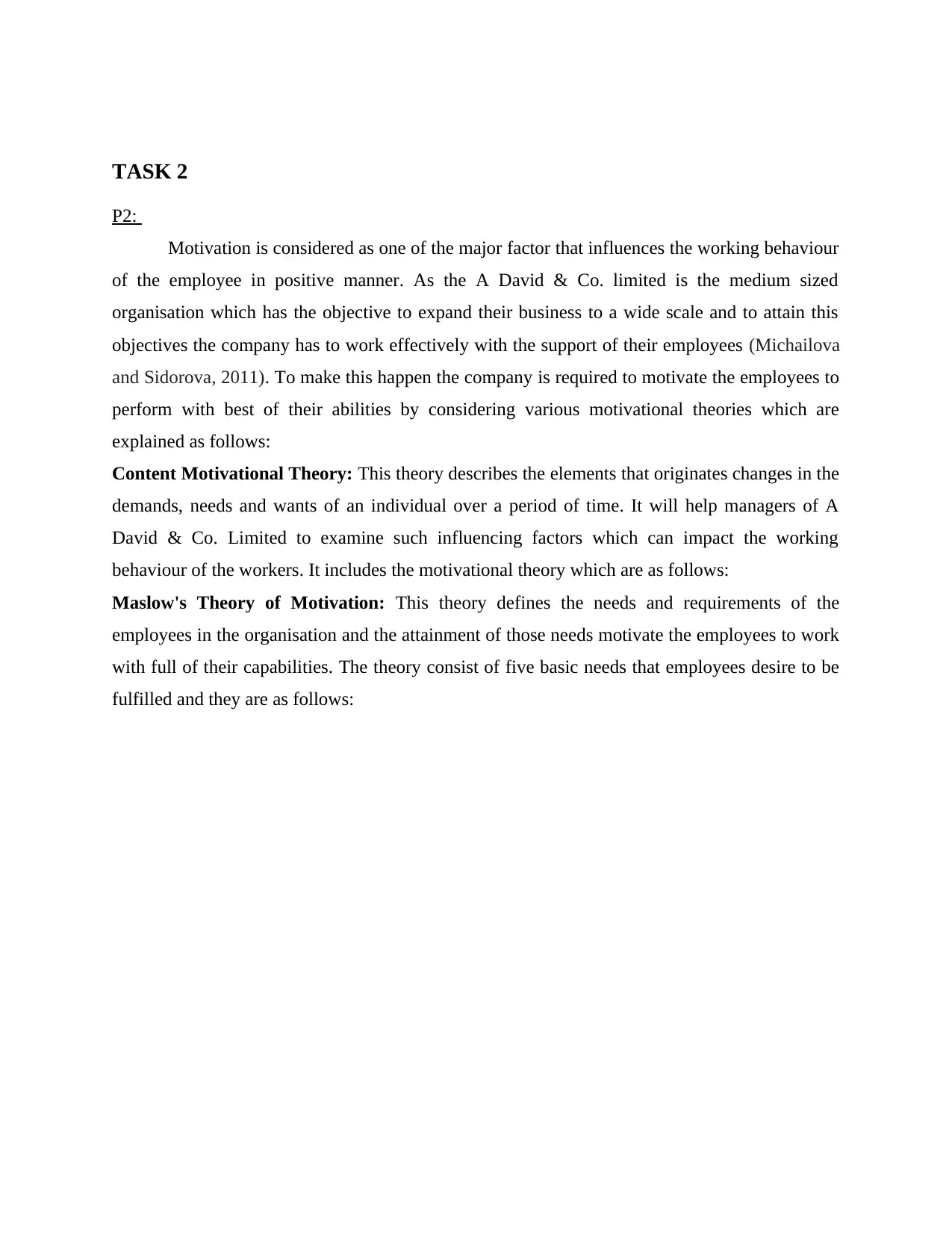
TASK 2
P2:
Motivation is considered as one of the major factor that influences the working behaviour
of the employee in positive manner. As the A David & Co. limited is the medium sized
organisation which has the objective to expand their business to a wide scale and to attain this
objectives the company has to work effectively with the support of their employees (Michailova
and Sidorova, 2011). To make this happen the company is required to motivate the employees to
perform with best of their abilities by considering various motivational theories which are
explained as follows:
Content Motivational Theory: This theory describes the elements that originates changes in the
demands, needs and wants of an individual over a period of time. It will help managers of A
David & Co. Limited to examine such influencing factors which can impact the working
behaviour of the workers. It includes the motivational theory which are as follows:
Maslow's Theory of Motivation: This theory defines the needs and requirements of the
employees in the organisation and the attainment of those needs motivate the employees to work
with full of their capabilities. The theory consist of five basic needs that employees desire to be
fulfilled and they are as follows:
P2:
Motivation is considered as one of the major factor that influences the working behaviour
of the employee in positive manner. As the A David & Co. limited is the medium sized
organisation which has the objective to expand their business to a wide scale and to attain this
objectives the company has to work effectively with the support of their employees (Michailova
and Sidorova, 2011). To make this happen the company is required to motivate the employees to
perform with best of their abilities by considering various motivational theories which are
explained as follows:
Content Motivational Theory: This theory describes the elements that originates changes in the
demands, needs and wants of an individual over a period of time. It will help managers of A
David & Co. Limited to examine such influencing factors which can impact the working
behaviour of the workers. It includes the motivational theory which are as follows:
Maslow's Theory of Motivation: This theory defines the needs and requirements of the
employees in the organisation and the attainment of those needs motivate the employees to work
with full of their capabilities. The theory consist of five basic needs that employees desire to be
fulfilled and they are as follows:
Paraphrase This Document
Need a fresh take? Get an instant paraphrase of this document with our AI Paraphraser
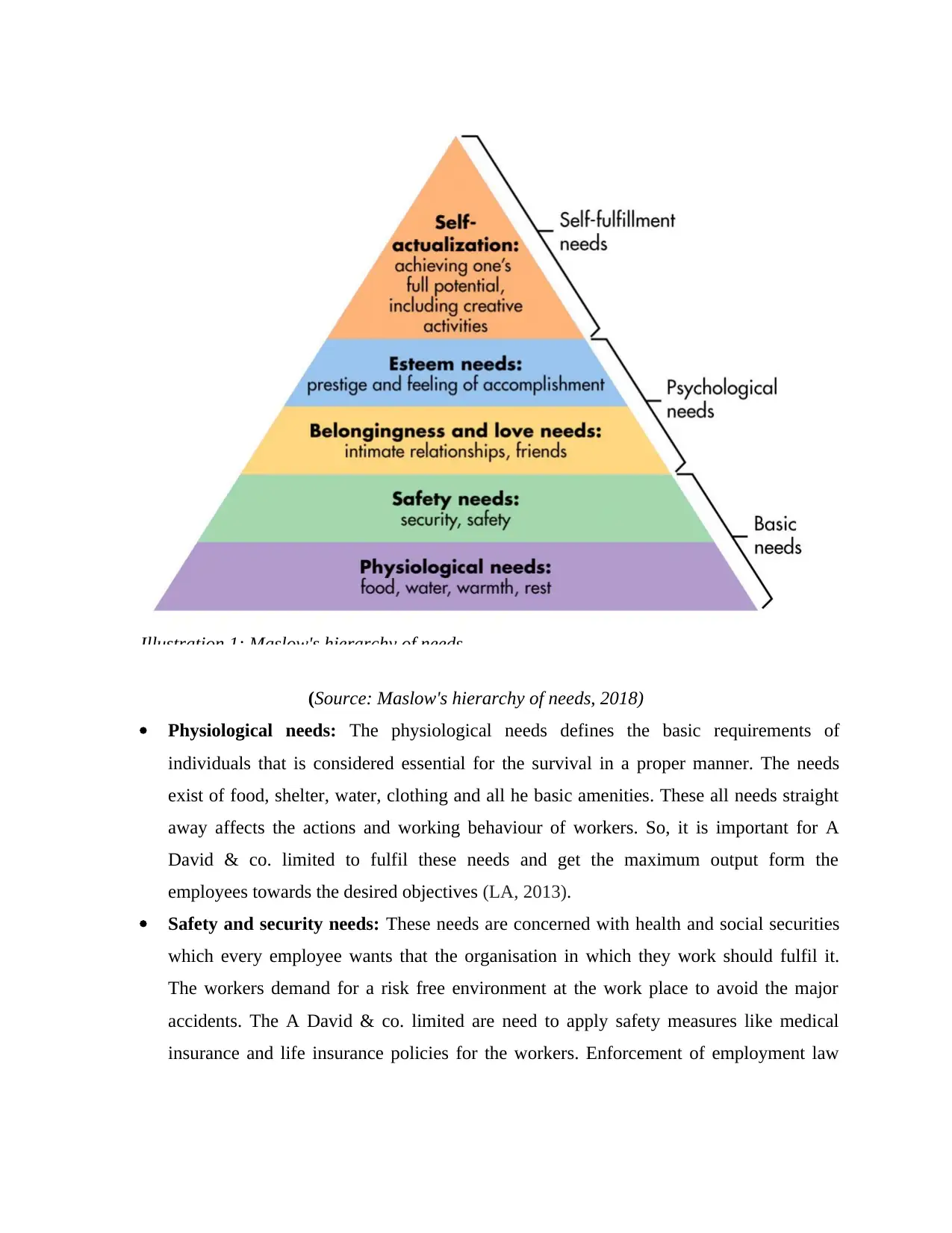
(Source: Maslow's hierarchy of needs, 2018)
Physiological needs: The physiological needs defines the basic requirements of
individuals that is considered essential for the survival in a proper manner. The needs
exist of food, shelter, water, clothing and all he basic amenities. These all needs straight
away affects the actions and working behaviour of workers. So, it is important for A
David & co. limited to fulfil these needs and get the maximum output form the
employees towards the desired objectives (LA, 2013).
Safety and security needs: These needs are concerned with health and social securities
which every employee wants that the organisation in which they work should fulfil it.
The workers demand for a risk free environment at the work place to avoid the major
accidents. The A David & co. limited are need to apply safety measures like medical
insurance and life insurance policies for the workers. Enforcement of employment law
Illustration 1: Maslow's hierarchy of needs
Physiological needs: The physiological needs defines the basic requirements of
individuals that is considered essential for the survival in a proper manner. The needs
exist of food, shelter, water, clothing and all he basic amenities. These all needs straight
away affects the actions and working behaviour of workers. So, it is important for A
David & co. limited to fulfil these needs and get the maximum output form the
employees towards the desired objectives (LA, 2013).
Safety and security needs: These needs are concerned with health and social securities
which every employee wants that the organisation in which they work should fulfil it.
The workers demand for a risk free environment at the work place to avoid the major
accidents. The A David & co. limited are need to apply safety measures like medical
insurance and life insurance policies for the workers. Enforcement of employment law
Illustration 1: Maslow's hierarchy of needs
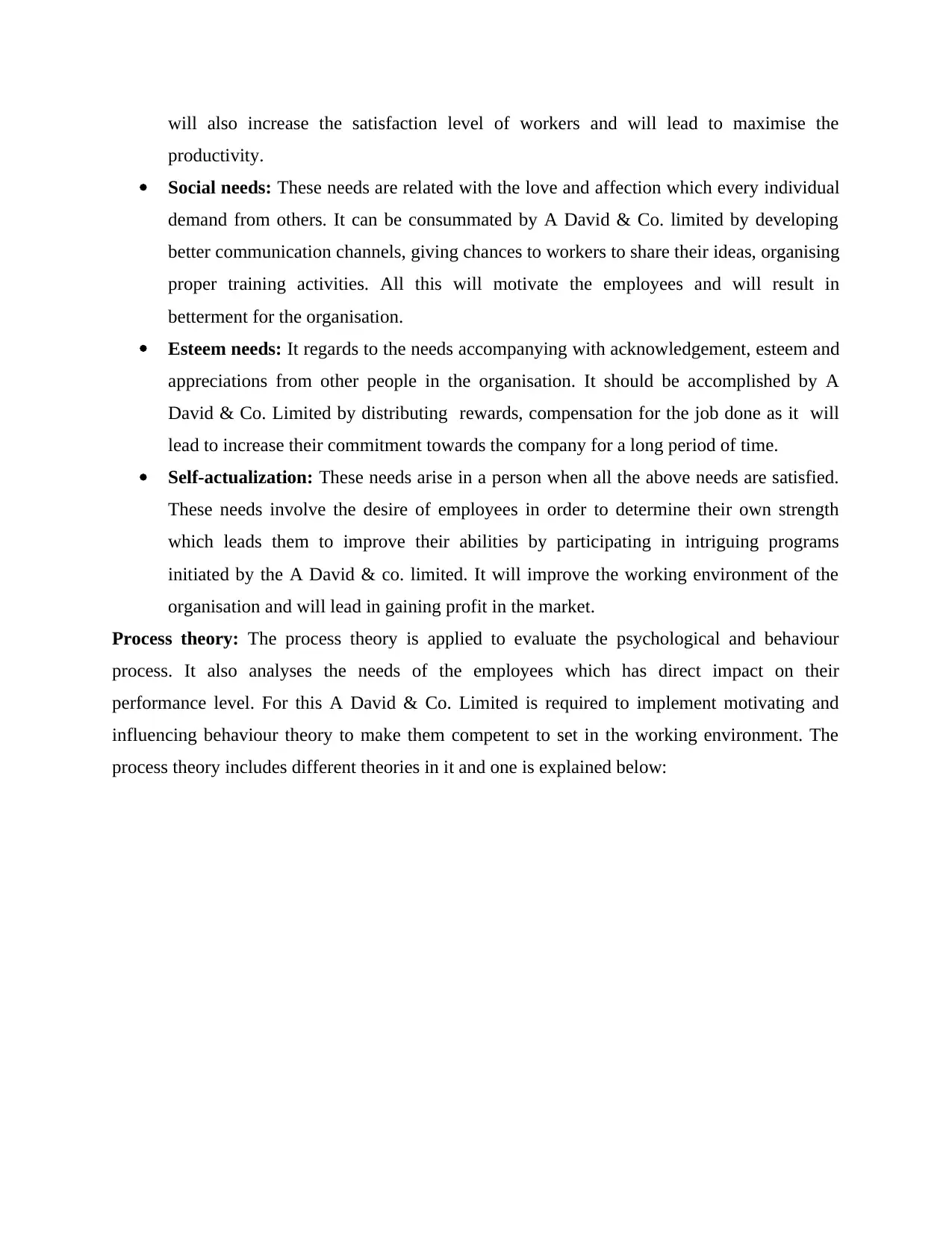
will also increase the satisfaction level of workers and will lead to maximise the
productivity.
Social needs: These needs are related with the love and affection which every individual
demand from others. It can be consummated by A David & Co. limited by developing
better communication channels, giving chances to workers to share their ideas, organising
proper training activities. All this will motivate the employees and will result in
betterment for the organisation.
Esteem needs: It regards to the needs accompanying with acknowledgement, esteem and
appreciations from other people in the organisation. It should be accomplished by A
David & Co. Limited by distributing rewards, compensation for the job done as it will
lead to increase their commitment towards the company for a long period of time.
Self-actualization: These needs arise in a person when all the above needs are satisfied.
These needs involve the desire of employees in order to determine their own strength
which leads them to improve their abilities by participating in intriguing programs
initiated by the A David & co. limited. It will improve the working environment of the
organisation and will lead in gaining profit in the market.
Process theory: The process theory is applied to evaluate the psychological and behaviour
process. It also analyses the needs of the employees which has direct impact on their
performance level. For this A David & Co. Limited is required to implement motivating and
influencing behaviour theory to make them competent to set in the working environment. The
process theory includes different theories in it and one is explained below:
productivity.
Social needs: These needs are related with the love and affection which every individual
demand from others. It can be consummated by A David & Co. limited by developing
better communication channels, giving chances to workers to share their ideas, organising
proper training activities. All this will motivate the employees and will result in
betterment for the organisation.
Esteem needs: It regards to the needs accompanying with acknowledgement, esteem and
appreciations from other people in the organisation. It should be accomplished by A
David & Co. Limited by distributing rewards, compensation for the job done as it will
lead to increase their commitment towards the company for a long period of time.
Self-actualization: These needs arise in a person when all the above needs are satisfied.
These needs involve the desire of employees in order to determine their own strength
which leads them to improve their abilities by participating in intriguing programs
initiated by the A David & co. limited. It will improve the working environment of the
organisation and will lead in gaining profit in the market.
Process theory: The process theory is applied to evaluate the psychological and behaviour
process. It also analyses the needs of the employees which has direct impact on their
performance level. For this A David & Co. Limited is required to implement motivating and
influencing behaviour theory to make them competent to set in the working environment. The
process theory includes different theories in it and one is explained below:
⊘ This is a preview!⊘
Do you want full access?
Subscribe today to unlock all pages.

Trusted by 1+ million students worldwide
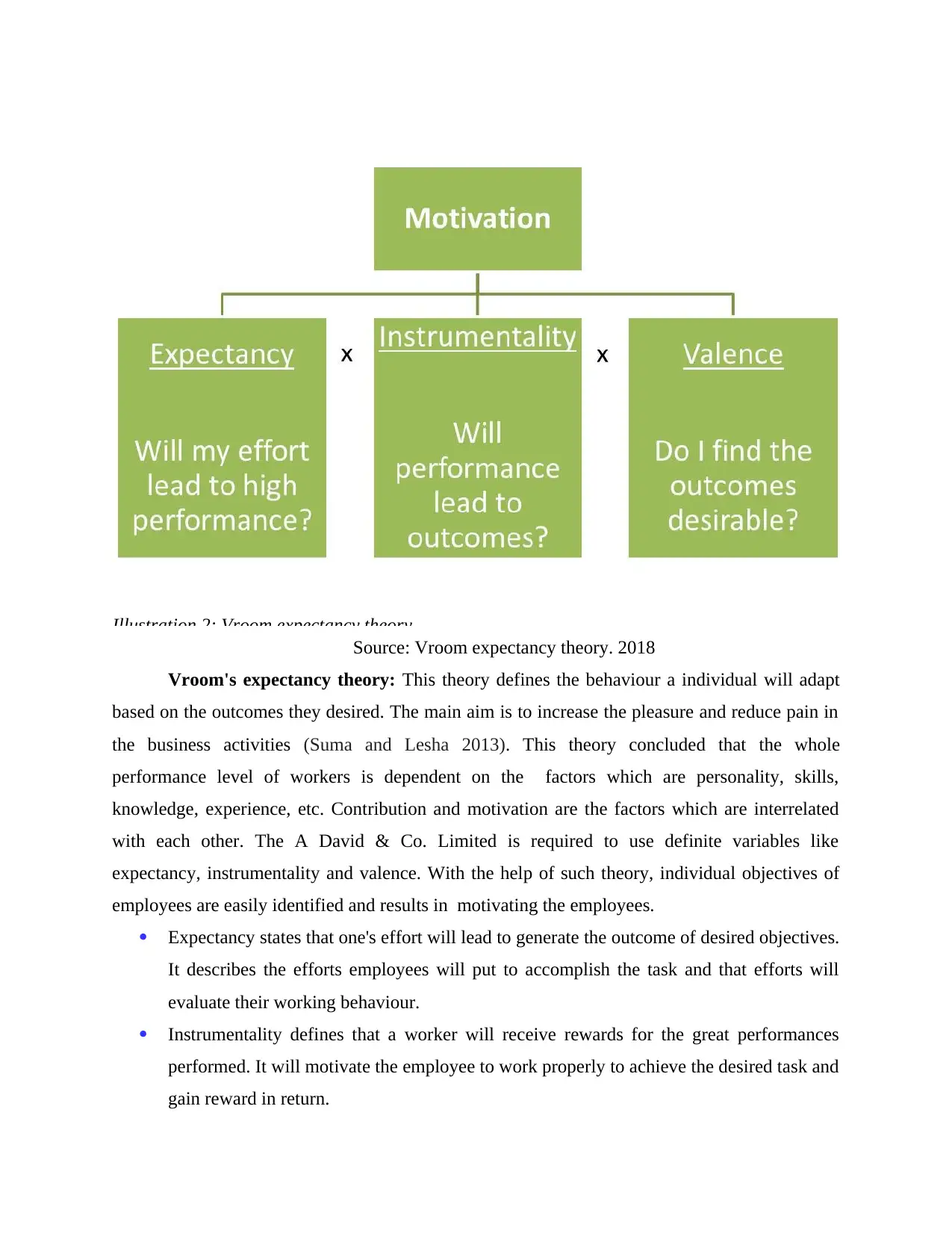
Source: Vroom expectancy theory. 2018
Vroom's expectancy theory: This theory defines the behaviour a individual will adapt
based on the outcomes they desired. The main aim is to increase the pleasure and reduce pain in
the business activities (Suma and Lesha 2013). This theory concluded that the whole
performance level of workers is dependent on the factors which are personality, skills,
knowledge, experience, etc. Contribution and motivation are the factors which are interrelated
with each other. The A David & Co. Limited is required to use definite variables like
expectancy, instrumentality and valence. With the help of such theory, individual objectives of
employees are easily identified and results in motivating the employees.
Expectancy states that one's effort will lead to generate the outcome of desired objectives.
It describes the efforts employees will put to accomplish the task and that efforts will
evaluate their working behaviour.
Instrumentality defines that a worker will receive rewards for the great performances
performed. It will motivate the employee to work properly to achieve the desired task and
gain reward in return.
Illustration 2: Vroom expectancy theory
Vroom's expectancy theory: This theory defines the behaviour a individual will adapt
based on the outcomes they desired. The main aim is to increase the pleasure and reduce pain in
the business activities (Suma and Lesha 2013). This theory concluded that the whole
performance level of workers is dependent on the factors which are personality, skills,
knowledge, experience, etc. Contribution and motivation are the factors which are interrelated
with each other. The A David & Co. Limited is required to use definite variables like
expectancy, instrumentality and valence. With the help of such theory, individual objectives of
employees are easily identified and results in motivating the employees.
Expectancy states that one's effort will lead to generate the outcome of desired objectives.
It describes the efforts employees will put to accomplish the task and that efforts will
evaluate their working behaviour.
Instrumentality defines that a worker will receive rewards for the great performances
performed. It will motivate the employee to work properly to achieve the desired task and
gain reward in return.
Illustration 2: Vroom expectancy theory
Paraphrase This Document
Need a fresh take? Get an instant paraphrase of this document with our AI Paraphraser
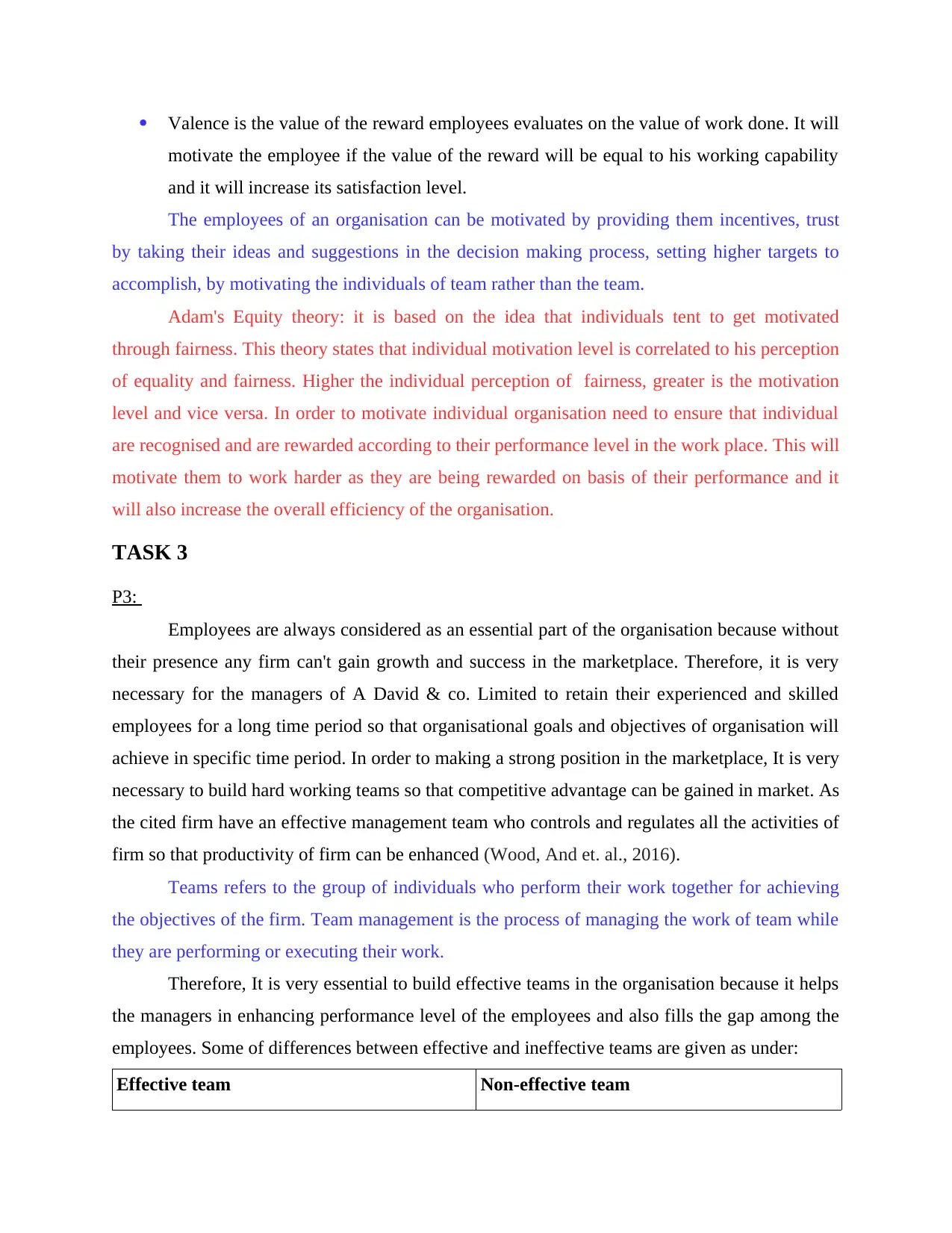
Valence is the value of the reward employees evaluates on the value of work done. It will
motivate the employee if the value of the reward will be equal to his working capability
and it will increase its satisfaction level.
The employees of an organisation can be motivated by providing them incentives, trust
by taking their ideas and suggestions in the decision making process, setting higher targets to
accomplish, by motivating the individuals of team rather than the team.
Adam's Equity theory: it is based on the idea that individuals tent to get motivated
through fairness. This theory states that individual motivation level is correlated to his perception
of equality and fairness. Higher the individual perception of fairness, greater is the motivation
level and vice versa. In order to motivate individual organisation need to ensure that individual
are recognised and are rewarded according to their performance level in the work place. This will
motivate them to work harder as they are being rewarded on basis of their performance and it
will also increase the overall efficiency of the organisation.
TASK 3
P3:
Employees are always considered as an essential part of the organisation because without
their presence any firm can't gain growth and success in the marketplace. Therefore, it is very
necessary for the managers of A David & co. Limited to retain their experienced and skilled
employees for a long time period so that organisational goals and objectives of organisation will
achieve in specific time period. In order to making a strong position in the marketplace, It is very
necessary to build hard working teams so that competitive advantage can be gained in market. As
the cited firm have an effective management team who controls and regulates all the activities of
firm so that productivity of firm can be enhanced (Wood, And et. al., 2016).
Teams refers to the group of individuals who perform their work together for achieving
the objectives of the firm. Team management is the process of managing the work of team while
they are performing or executing their work.
Therefore, It is very essential to build effective teams in the organisation because it helps
the managers in enhancing performance level of the employees and also fills the gap among the
employees. Some of differences between effective and ineffective teams are given as under:
Effective team Non-effective team
motivate the employee if the value of the reward will be equal to his working capability
and it will increase its satisfaction level.
The employees of an organisation can be motivated by providing them incentives, trust
by taking their ideas and suggestions in the decision making process, setting higher targets to
accomplish, by motivating the individuals of team rather than the team.
Adam's Equity theory: it is based on the idea that individuals tent to get motivated
through fairness. This theory states that individual motivation level is correlated to his perception
of equality and fairness. Higher the individual perception of fairness, greater is the motivation
level and vice versa. In order to motivate individual organisation need to ensure that individual
are recognised and are rewarded according to their performance level in the work place. This will
motivate them to work harder as they are being rewarded on basis of their performance and it
will also increase the overall efficiency of the organisation.
TASK 3
P3:
Employees are always considered as an essential part of the organisation because without
their presence any firm can't gain growth and success in the marketplace. Therefore, it is very
necessary for the managers of A David & co. Limited to retain their experienced and skilled
employees for a long time period so that organisational goals and objectives of organisation will
achieve in specific time period. In order to making a strong position in the marketplace, It is very
necessary to build hard working teams so that competitive advantage can be gained in market. As
the cited firm have an effective management team who controls and regulates all the activities of
firm so that productivity of firm can be enhanced (Wood, And et. al., 2016).
Teams refers to the group of individuals who perform their work together for achieving
the objectives of the firm. Team management is the process of managing the work of team while
they are performing or executing their work.
Therefore, It is very essential to build effective teams in the organisation because it helps
the managers in enhancing performance level of the employees and also fills the gap among the
employees. Some of differences between effective and ineffective teams are given as under:
Effective team Non-effective team
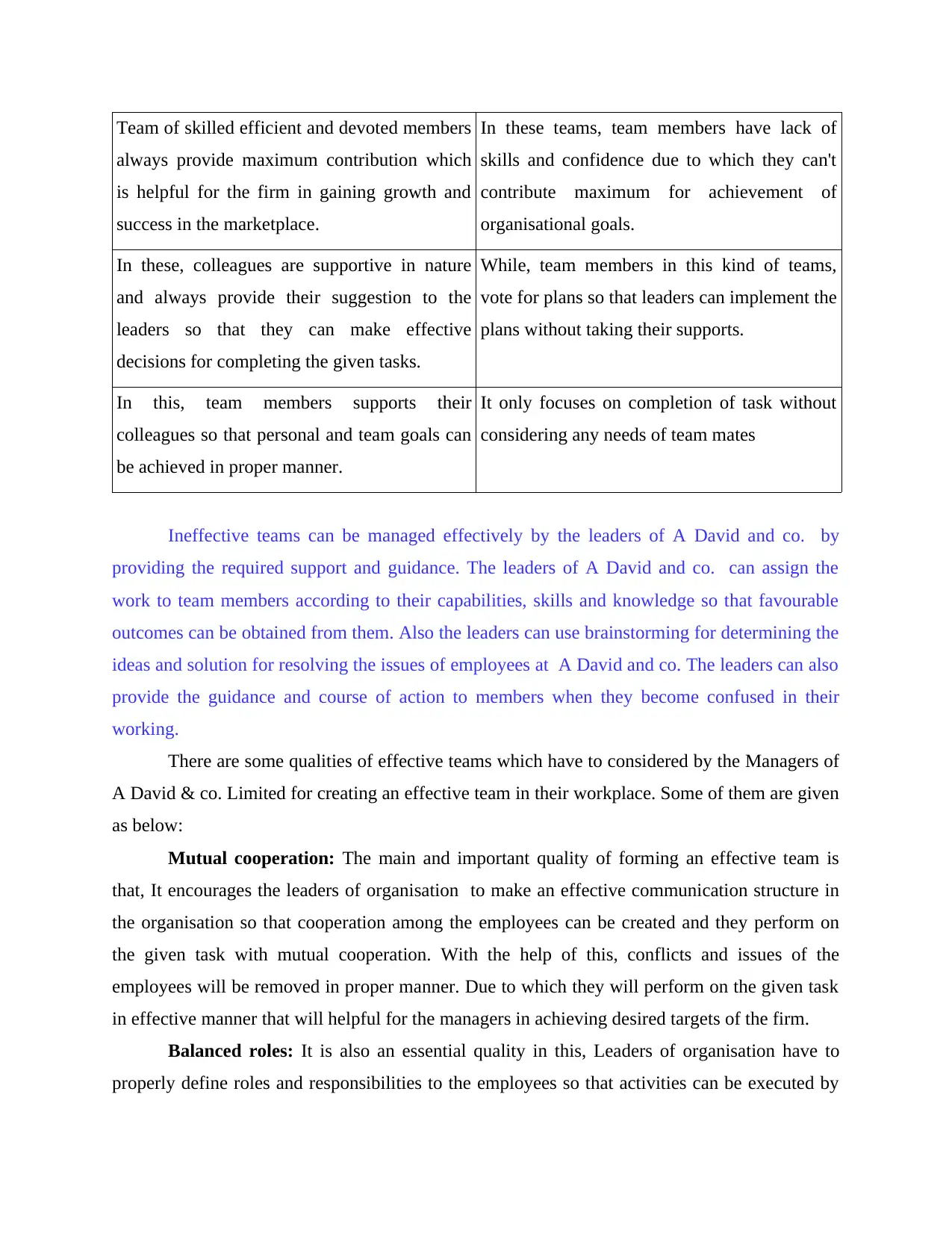
Team of skilled efficient and devoted members
always provide maximum contribution which
is helpful for the firm in gaining growth and
success in the marketplace.
In these teams, team members have lack of
skills and confidence due to which they can't
contribute maximum for achievement of
organisational goals.
In these, colleagues are supportive in nature
and always provide their suggestion to the
leaders so that they can make effective
decisions for completing the given tasks.
While, team members in this kind of teams,
vote for plans so that leaders can implement the
plans without taking their supports.
In this, team members supports their
colleagues so that personal and team goals can
be achieved in proper manner.
It only focuses on completion of task without
considering any needs of team mates
Ineffective teams can be managed effectively by the leaders of A David and co. by
providing the required support and guidance. The leaders of A David and co. can assign the
work to team members according to their capabilities, skills and knowledge so that favourable
outcomes can be obtained from them. Also the leaders can use brainstorming for determining the
ideas and solution for resolving the issues of employees at A David and co. The leaders can also
provide the guidance and course of action to members when they become confused in their
working.
There are some qualities of effective teams which have to considered by the Managers of
A David & co. Limited for creating an effective team in their workplace. Some of them are given
as below:
Mutual cooperation: The main and important quality of forming an effective team is
that, It encourages the leaders of organisation to make an effective communication structure in
the organisation so that cooperation among the employees can be created and they perform on
the given task with mutual cooperation. With the help of this, conflicts and issues of the
employees will be removed in proper manner. Due to which they will perform on the given task
in effective manner that will helpful for the managers in achieving desired targets of the firm.
Balanced roles: It is also an essential quality in this, Leaders of organisation have to
properly define roles and responsibilities to the employees so that activities can be executed by
always provide maximum contribution which
is helpful for the firm in gaining growth and
success in the marketplace.
In these teams, team members have lack of
skills and confidence due to which they can't
contribute maximum for achievement of
organisational goals.
In these, colleagues are supportive in nature
and always provide their suggestion to the
leaders so that they can make effective
decisions for completing the given tasks.
While, team members in this kind of teams,
vote for plans so that leaders can implement the
plans without taking their supports.
In this, team members supports their
colleagues so that personal and team goals can
be achieved in proper manner.
It only focuses on completion of task without
considering any needs of team mates
Ineffective teams can be managed effectively by the leaders of A David and co. by
providing the required support and guidance. The leaders of A David and co. can assign the
work to team members according to their capabilities, skills and knowledge so that favourable
outcomes can be obtained from them. Also the leaders can use brainstorming for determining the
ideas and solution for resolving the issues of employees at A David and co. The leaders can also
provide the guidance and course of action to members when they become confused in their
working.
There are some qualities of effective teams which have to considered by the Managers of
A David & co. Limited for creating an effective team in their workplace. Some of them are given
as below:
Mutual cooperation: The main and important quality of forming an effective team is
that, It encourages the leaders of organisation to make an effective communication structure in
the organisation so that cooperation among the employees can be created and they perform on
the given task with mutual cooperation. With the help of this, conflicts and issues of the
employees will be removed in proper manner. Due to which they will perform on the given task
in effective manner that will helpful for the managers in achieving desired targets of the firm.
Balanced roles: It is also an essential quality in this, Leaders of organisation have to
properly define roles and responsibilities to the employees so that activities can be executed by
⊘ This is a preview!⊘
Do you want full access?
Subscribe today to unlock all pages.

Trusted by 1+ million students worldwide
1 out of 22
Related Documents
Your All-in-One AI-Powered Toolkit for Academic Success.
+13062052269
info@desklib.com
Available 24*7 on WhatsApp / Email
![[object Object]](/_next/static/media/star-bottom.7253800d.svg)
Unlock your academic potential
Copyright © 2020–2025 A2Z Services. All Rights Reserved. Developed and managed by ZUCOL.





